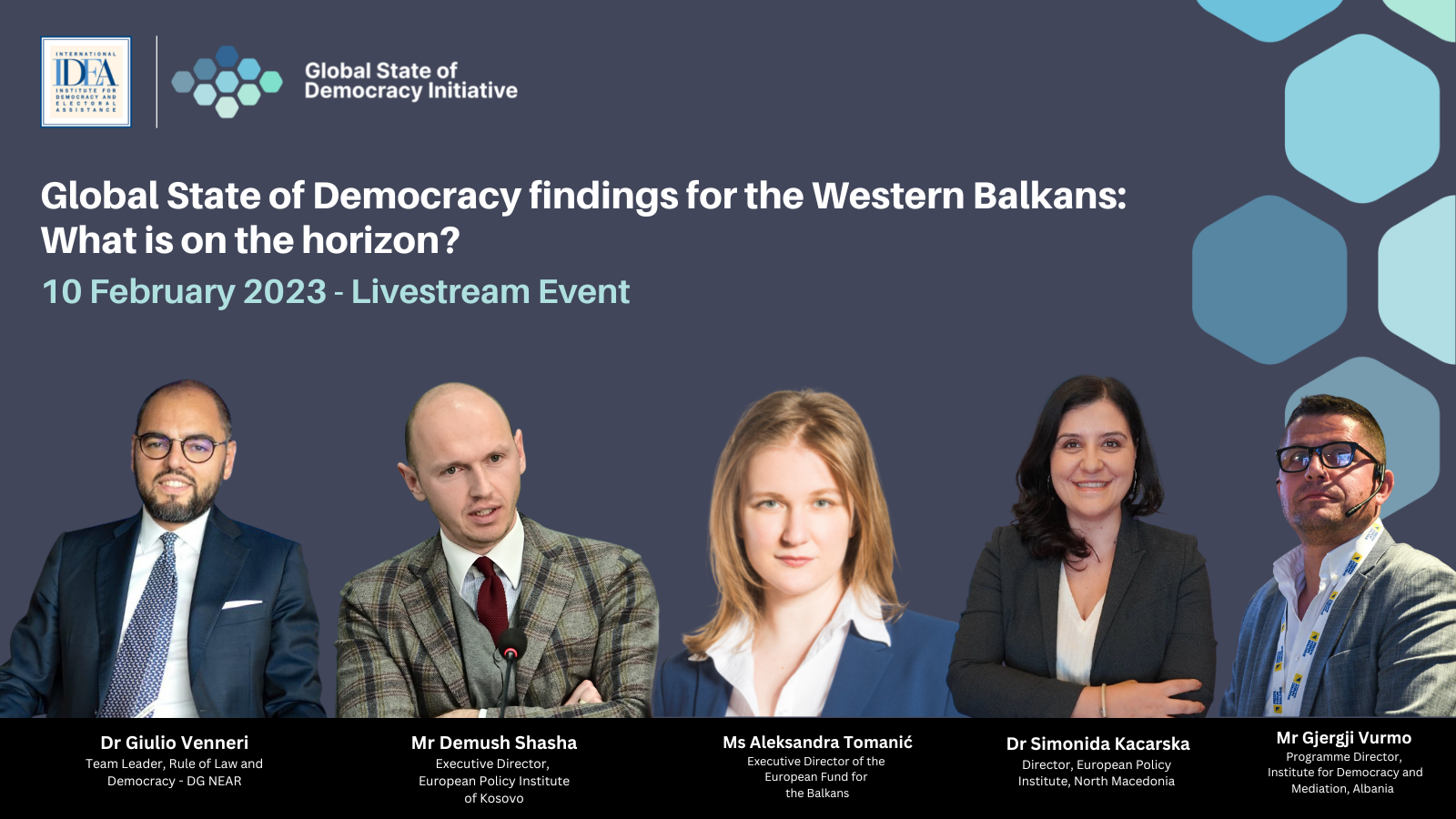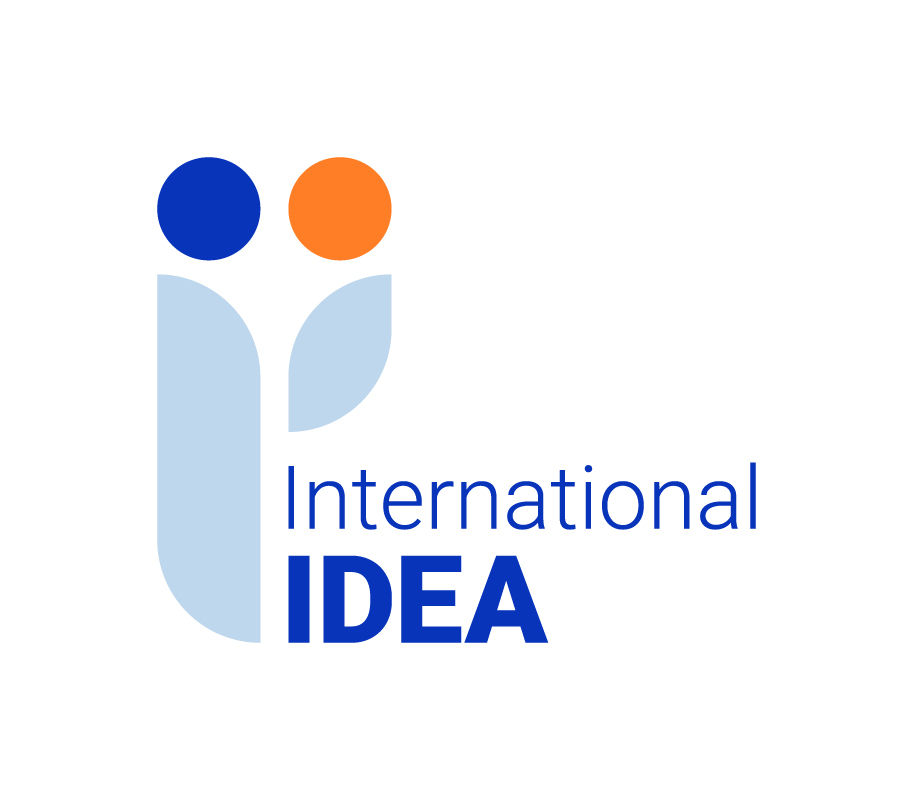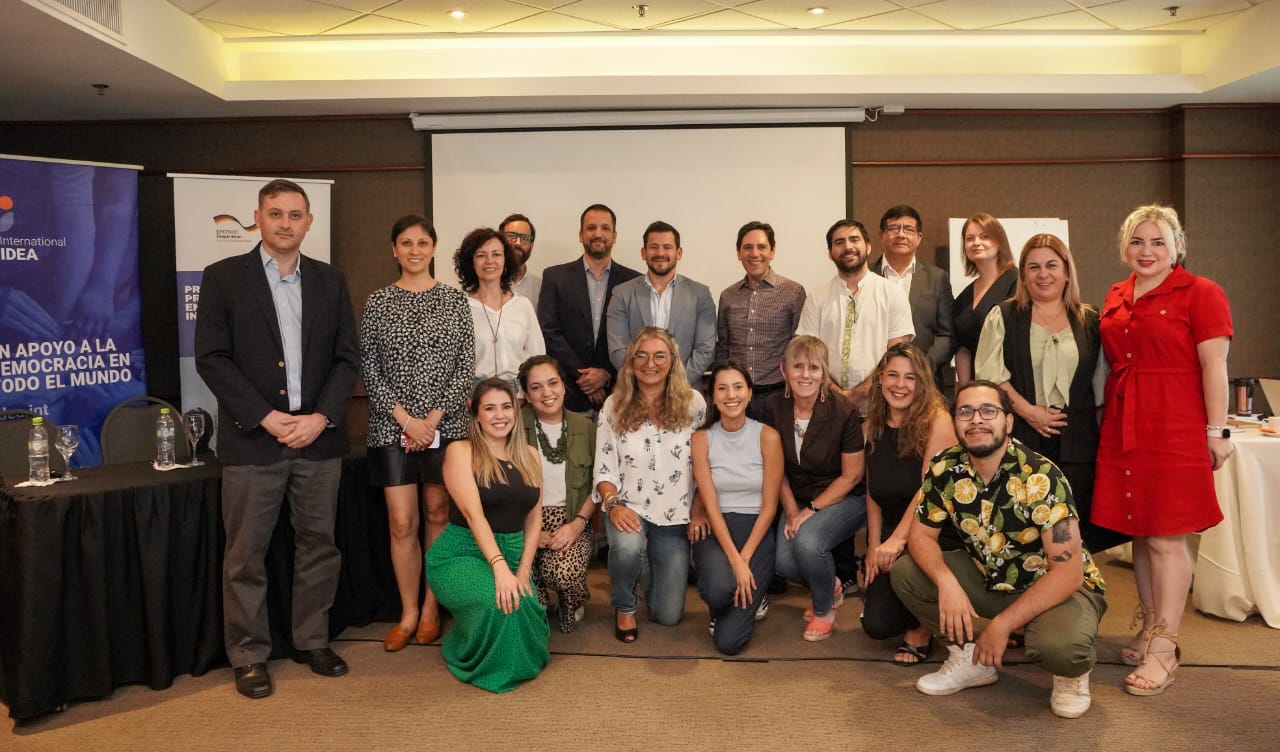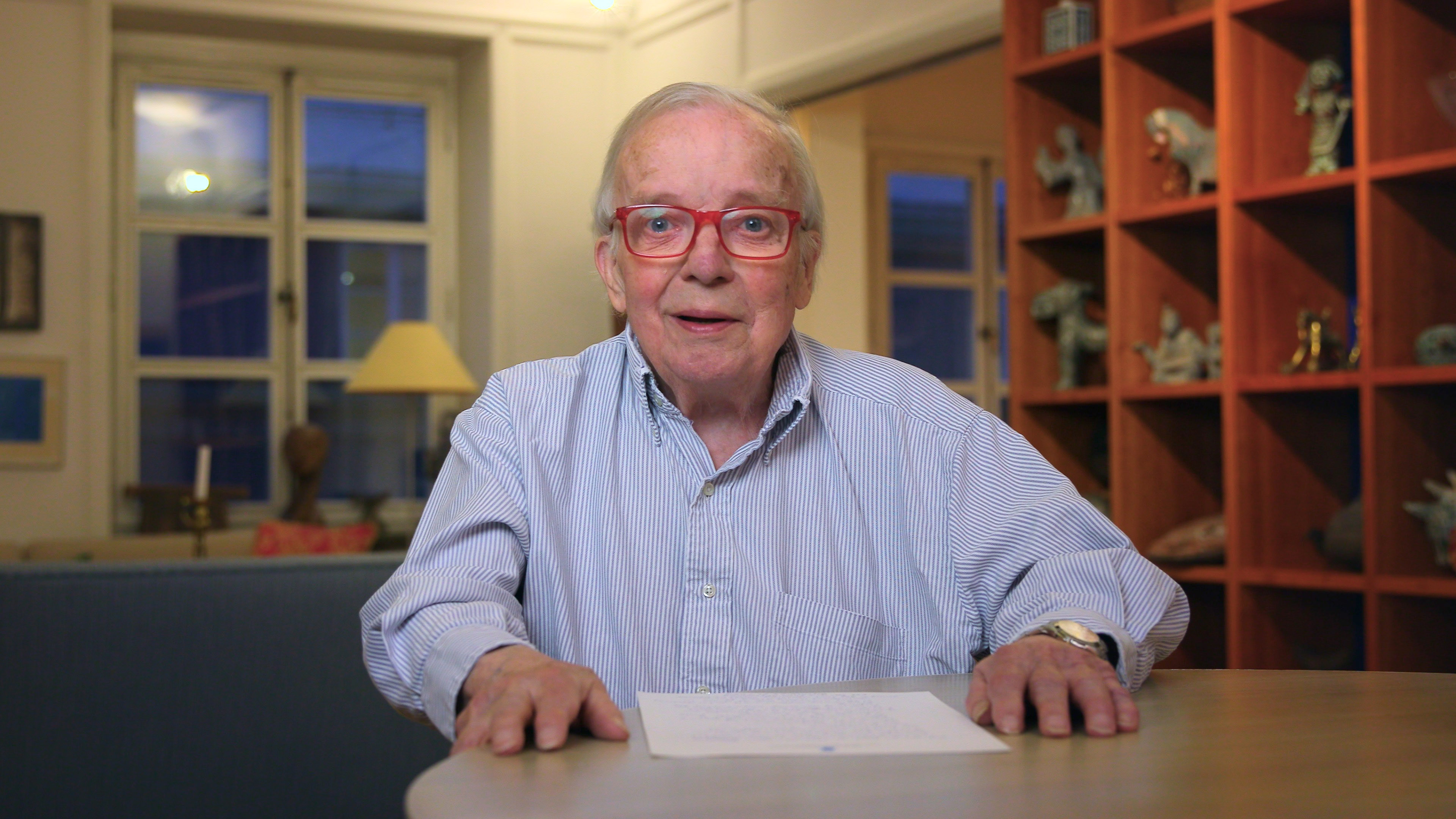Global State of Democracy findings for the Western Balkans: What is on the horizon?

International IDEA held an online panel discussion on the latest Global State of Democracy (GSoD) Indices findings on the six countries in the Western Balkans (Albania, Bosnia and Herzegovina, Kosovo, North Macedonia, Montenegro and Serbia) on 10 February 2023.
The discussion convened a panel of eminent thinkers and experts from think tanks, foundations, and NGOs from the region, and was attended by 120 participants. The discussion looked ahead to the way forward for the Western Balkans in order to protect and invigorate democracy across the region. The video of the event can be found on this YouTube link.
The event began with opening remarks by Mr Sam van der Staak, Director of International IDEA's Regional Europe Programme and Dr Giulio Venneri, Team leader at the Rule of law and Democracy Team of European Commission’s Directorate-General for Neighbourhood and Enlargement Negotiations (DG NEAR). These remarks provided an overview of the challenges to democracy in the region – identifying factors behind the subversion of democracy from the outside, but also from within – as well as recent positive signals.
Key takeaways from the opening remarks
- There have been recent positive developments with regard to EU enlargement, including the accession negotiations with Albania and North Macedonia, the granting of candidate status to Bosnia and Herzegovina in December 2022, and the recent announcement of a timeline for visa liberalization for Kosovo.
- The European Commission has urged countries to deliver on key democratic reforms to fulfil their membership aspirations, demonstrating a clear link between EU accession and democracy consolidation.
- The revised methodology for EU accession can be an opportunity to reinforce the work on democracy, as it pays increasing importance to the functioning of democratic institutions.
- Important pillars of action identified by the European Commission include electoral processes, functioning of the Parliament, and civil society.
- There has also been a call for increased political will for reforms on the rule of law, and to develop a strategic approach to anti-corruption in all sectors, especially those most vulnerable to corruption, which require more targeted measures.
Next, International IDEA’s Democracy Assessment team delivered presentations on the most important trends in democratic performance according to the GSoD Indices. The presentations examined the GSoD Indices data at the global, European and Western Balkans levels of analysis.
Key takeaways from International IDEA’s Democracy Assessment team presentations
- In the Western Balkans, Kosovo, Montenegro and North Macedonia are classified as mid-range performing democracies by the GSoD Indices. Albania, and Bosnia and Herzegovina are considered weak democracies. Serbia is the region’s only hybrid regime, and one of five non-democracies in Europe. The majority of people in the Western Balkans (61 per cent) live in a democracy. Impartial Administration is the only of the GSoD Indices’ five key democratic attributes with low performing countries in the Western Balkans (including Serbia, Albania and Bosnia and Herzegovina). Kosovo registered a significant increase compared to 2016 and 2011, becoming the strongest in the region in this attribute. In 2021, Kosovo performed above the average for Central Europe in Impartial Administration. Serbia has declined significantly in Checks on Government, moving from the strongest in the region to the weakest in the span of 10 years. Otherwise, there has been a great deal of stagnation. Bosnia and Herzegovina and Serbia saw significant declines in Media Integrity.
- While democracy remains the main form of government in Europe, its performance is stagnant, and in many cases eroding, where 43 per cent of democracies in Europe have suffered erosion in the last five years and 49 per cent of all Europeans live in an eroding democracy. In parallel, Europe’s non-democratic regimes have been further consolidated in the last year.
- Democracy is in retreat around the world, and the quality of existing democracies is in decline: Fifty-two democracies are considered eroding in 2021, compared to only 12 democracies in 2012. Furthermore, democratic growth has stalled and there is evidence that public support for authoritarian values is growing. The presentations highlighted some signs of hope, and examples of democratic expansion around the world.
The presentations were followed by a panel discussion and a Q&A session with members of the audience. Panelists identified both external and internal challenges to Western Balkans countries. The distinguished panel consisted of:
- Ms Aleksandra Tomanić, Executive Director of the European Fund for the Balkans
- Mr Demush Shasha, Executive Director, European Policy Institute of Kosovo
- Mr Gjergji Vurmo, Programme Director, Institute for Democracy and Mediation, Albania
- Dr Simonida Kacarska, Director, European Policy Institute, North Macedonia
Key takeaways from the panel discussion and the Q&A session
- The proper functioning of democracy has not been undermined in a single dramatic act but through a series of small little steps, including diminishing checks on power, limited meaningful opposition, and weakened investigative journalism.
- There is a lack of international political attention to the region. Panelists noted the importance of Western allies in reducing ethnic tension in Western Balkans and expressed that there cannot be continuous progress in the region without the support of the EU and/or US.
- Panelists considered Russian aggression in Ukraine a massive test for the EU in the defense of democracy. The future of the Western Balkans will be determined by the war in Ukraine, where a victory will allow the region to blossom, while by contrast a defeat will bring a grave future.
- Panelists also emphasized the responsibility of the EU: as accession to the bloc is the strategic objective of many countries in the region, the EU needs to provide more clarity on its enlargement strategy. Panelists pointed to an issue in which EU officials overlook strong pledges on democracy, while praising governments for small progress. Finally, EU interventions should address the long-run rather than focusing on short-term fixes.
- Important internal issues in the Western Balkans identified by the panel include a lack of hope among young people leading to an exodus from the region, a lack of public trust in institutions, and shrinking civic space.
- There are many positive examples of local movements and civic initiatives across the region. In addition, civic education is increasing, which helps people to become aware and engaged in politics. The priority should not be that civic initiatives become institutionalized or become long lasting, but rather that they emerge, self-organize and show awareness of their context. Civil society can play a role in reaching out to disengaged populations, and in addressing dwindling voter turnout.
- Democracy should not be taken for granted. Democracy must be treated as a verb, not as something surviving on its own, but something that requires each of us to take action. It is concerning that the number of democracies around the world is in decline, but the most concerning finding is the reduction in the number of democrats, ie. supporters of democratic institutions and processes. The positive cases in the region share one key ingredient: the people that are dedicated to democracy.
- Panelists expressed hopes that the future of the Western Balkans holds more democrats, and hoped to witness the expansion of societies that stand for democratic values. Democracy depends on whether societies succeed in increasing the number of people fighting for the value of democracy at home.
Watch the event below
For enquiries, please contact:
Blerta Hoxha, Programme Officer, Regional Europe Programme at B.Hoxha@idea.int
Gentiana Gola, Programme Officer, Democracy Assessment Unit at G.Gola@idea.int


